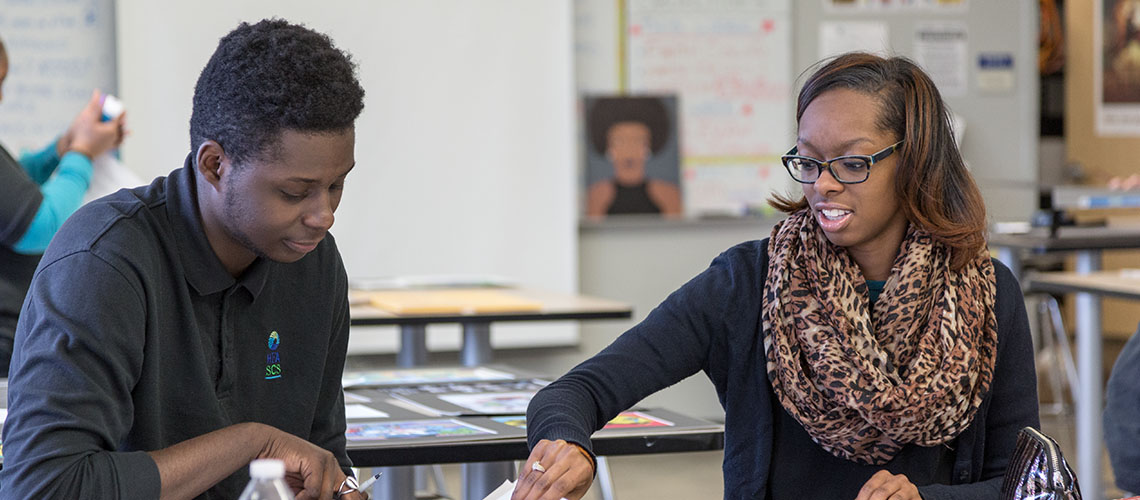
Since he was a young boy, Devon Yancy has loved to spend time with paper, pencils, and his imagination. Growing up on the east side of Detroit, he attended an elementary school that focused on math and science, but when he and his mom visited the Henry Ford Academy: School for Creative Studies (HFA), he felt like he had discovered a new world.
“I’d never been to a school like that before,” says Yancy. “We saw the art and design programs, and I knew attending HFA would be a chance to do what I love.”
At a time when other public schools are cutting their art programs, Henry Ford uses art as the core of its curriculum. The charter school was started in 2009 through a partnership between Detroit’s College for Creative Studies (CCS), one of the nation’s top designs schools, and the Henry Ford Learning Institute, a nonprofit organization founded by Ford Motor Company.
Serving 900 students in grades six through 12, HFA is located in the A. Arthur Taubman Center for Design Education. This building is also home to the Detroit Creative Corridor Center (CCS), a business incubator for creative enterprises, and Shinola, a national brand dedicated to producing American-made products.

Devon Yancy recently graduated from Detroit’s Henry Ford Academy and is now attending the College for Creative Studies.
Entering Henry Ford Academy as a high school freshman, Devon says he loved his classes, but he stumbled during his sophomore year after his parents separated.
“I felt lost for a while,” he recalls. “My grades started to drop and my priorities changed. I was real concerned about my mom. I didn’t tell anyone what I was feeling.”
But teachers and administrators noticed. “They talked to me about the importance of hard work and what you can accomplish,” he says. “I began to indulge myself in afterschool activities. I started to see my potential.”
During his senior year, Devon applied for the prestigious Gates Millennium Scholars Program, funded by the Bill & Melinda Gates Foundation to develop future leaders by removing barriers to education for high-performing, low-income students. Out of more than 50,000 applicants, Devon was chosen to be a recipient of a full scholarship to the college of his choice.
He didn’t go far. Devon choose to remain in the building and attend CCS. He is currently a freshman studying product design.
Curtis Lewis, Ph.D., principal of HFA, says students like Devon are able to expand their opportunities because of the school’s unique approach.
“Music, art, and design help students to engage in creative critical thinking,” says Lewis. “It affects them not only in artistic ways, but in ways that enhance their learning in core subjects—language arts, math, science, and social studies classes. When you give kids an opportunity to be creative, you educate the whole child. You get the entire brain working. Students who aren’t given opportunity to express themselves creatively lose out.”
The national graduation rate is 75 percent, compared with the general Detroit rate of 62 percent, according to Education Week. At Henry Ford Academy, the graduation rate for the Class of 2014 was 95 percent, with 64 percent going on to postsecondary education, and students offered more than $2.4 million in scholarships.
Because of its inclusive structure, HFA provides students—98 percent of whom are African American—with an opportunity many might not have been able to afford: a majority live in the area surrounding the school where more than a third of residents live below the poverty line and 82 percent of students quality for free or reduced-price lunches.

Henry Ford Academy students acquire hands-on experience through projects done in cooperation with the College for Creative Studies and other business located in the building.
“As a mission-driven lender, our goal is to finance projects that drive social impact in underserved communities by increasing access to a high-quality education and other important services,” said Terry Simonette, president and CEO of Capital Impact Partners. “To see how the Henry Ford Academy has helped students like Devon thrive is truly inspiring.”
The historic A. Alfred Taubman Center for Design Education—formerly known as the Argonaut Building—had sat vacant for a decade until Capital Impact Partners provided the financing critical to bringing it back to life as an important contributor to the vitality of the neighborhood.
Because of its unique location, HFA students are able to acquire hands-on experience through projects done in cooperation with CCS as well as with some of the businesses located in the building, including Shinola. Four times a year, students engage in design challenges that tackle real life problems, and each spring, students participate in a regional exhibition, putting their work on display for the public.

Devon with Henry Ford Academy Principal Curtis Lewis, Ph.D.
“We make sure our students are prepared for both college and work,” says Lewis. “Their maturity level is remarkable. Here, they hone an ability to articulate and express themselves.”
Young adults like Devon are proof: “If I hadn’t gone to Henry Ford Academy, I wouldn’t be at CCS—I probably would be working at a grocery store or Kmart right now,” he says.
All pictures © 2015 Capital Impact Partners / Peter Baker







